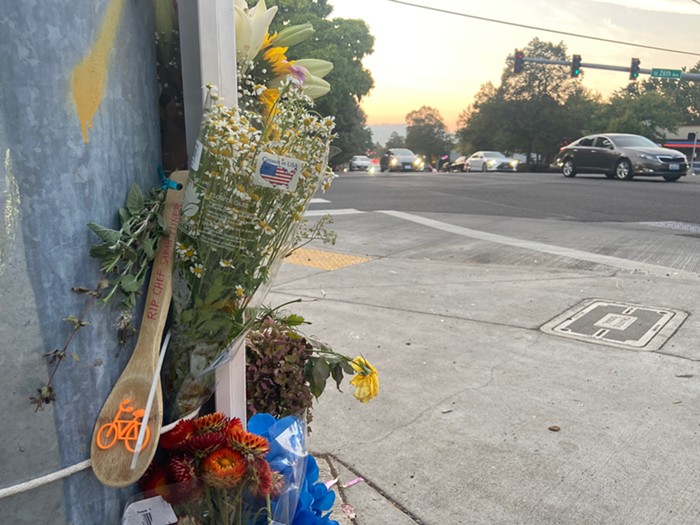
As Multnomah County officials work to slow the spread of COVID-19, county employees outside of the medical, public health, and first responder departments are being asked to volunteer at emergency homeless shelters.
Some employees say they’re happy to help. But others are finding it difficult to weigh their public duty with their desire to protect their own health, and that of their families. They're also worried about what workplace repercussions they will face if they decline. Multnomah County Auditor Jennifer McGuirk told the Mercury that she has been contacted by some county employees who question what the consequences will be for people who refuse to volunteer at the shelters.
“The question I have gotten from some county employees has been ‘To what extent is it okay to decline?’” McGuirk said. “Whether that’s because they have an at-risk loved one or they themselves are at-risk, [or] they’re a single parent and don’t know what would happen if they got sick and who could take care of their kids. There have been concerns about, ‘What are the ramifications if I don’t volunteer?’”
An email obtained by the Mercury, sent by the county’s human resources department to county employees on Friday afternoon, asked workers at some county departments to volunteer to work shifts at the new emergency shelter at the Oregon Convention Center, as well as at hotels that are currently being used as emergency shelters.
According to the email, these shelters will not house people who have tested positive for COVID-19. The hotels are for people who are showing respiratory symptoms, but county volunteers “are not intended or expected to come into direct contact” with them. The Convention Center shelter is for unhoused people who are not showing any symptoms.
The email describes volunteer tasks at the hotel shelters as “delivering food outside hotel rooms, keeping an eye on the property, [and] visual checks of guests from a distance." Volunteers at the Convention Center will be asked to clean and assemble dorm spaces, serve and prepare food, hand out supplies, and use their specific skills such as “basic first aid, conflict management, [and] counseling.”
The email stresses that the paid positions are on a volunteer basis. It also tells county employees that “As public servants, this is our time to support our community.”
Not all county employees are eager to volunteer.
One employee spoke with the Mercury on the condition that we keep their name and details about their job anonymous, citing fear of retaliation from managers. They said that they won’t be volunteering because they want to limit all outside contact, and want to protect their partner and children from contracting COVID-19. According to the Centers for Disease Control and Prevention (CDC), people who do not show symptoms can still be carriers of COVID-19, and it can also be contracted by touching surfaces.
“I’m not a public health employee,” they said. “[I] have been isolating for a week at home, then all of a sudden we’re supposed to go out to these shelters and do this stuff… I know I’m damn good at my job, but this is not my job.”
The employee added that they were worried that their less-assertive coworkers might feel pressured to volunteer despite their hesitations. They also said that they would ordinarily be eager to help during an emergency, but given the particular nature of a pandemic, volunteering was too big of a risk.
“If this were an earthquake, if this were anything other than a public health crisis, I’d already be out there in a heartbeat,” they said. “But this is a public health crisis... I will help out however I can from home, but I’m not going against what all public health officials are saying right now [to stay home].”
Martha Flotten, a manager at the county library’s Hollywood branch, said she also is worried about the effect volunteering could have on her family’s health. But she decided she would volunteer anyway, saying it aligned with her public service mission as a librarian.
“There’s so much that we don’t know about the virus,” Flotten said. “It was a tough process to go through to weigh my feelings for public service, along with my concerns for my family and my own health. But I came to the conclusion after talking with my husband that I am in the place to be able to help more than others who truly have a medical issue and can’t.”
Flotten called that choice a “personal decision”—one she “wouldn’t expect of everyone.”
“Everyone’s in a different place,” she added.
Multnomah County Library spokesperson Shawn Cunningham sent the Mercury a statement on shelter volunteering on behalf of Multnomah County.
“Multnomah County leaders have asked staff across the county to volunteer for the critical need of staffing shelters to keep people safe,” Cunningham wrote. “During this time of anxiety and concern, some people have expressed reluctance to volunteer for that work and that’s understandable. Multnomah County would not knowingly put its employees in harm's way. … This situation is evolving quickly and needs will increase, so we will consider every avenue to provide support.”
A spokesperson for ASFCME Local 88, the union that represents Multnomah County employees, said the union is working on a “broad” agreement with the county about staffing shelters and other county services, deciding which employees are considered essential (meaning they would be exempt from requirements to work from home), and other considerations. That agreement will likely be finalized and made public by Tuesday.
The county will use social distancing and handwashing guidelines from the CDC for all shelter volunteers, but it’s unclear whether all volunteers will be given medical masks and other protective wear, considering there are currently widespread shortages of these supplies.
As the county's elected auditor, it’s McGuirk’s job to serve as a watchdog over different county functions, making sure they comply with county code and best practices guidelines. When asked where it is appropriate for the county to ask employees who are not medical workers or first responders to volunteer at shelters, McGuirk said she would need to study best practices and look at what other jurisdictions are doing in the face of the coronavirus pandemic.
“I do know we would want to see people working in the facilities already be trained, so they aren’t having to learn on the fly,” she said. She added that county employees should not feel pressured to volunteer.
“Not everybody who works for government does so because they want to be working in public health,” she said. “I think people are feeling really torn.”
McGuirk said she’s made it clear to her staffers that volunteering, or not volunteering, is their own decision to make.
“The message I’ve given to my staff is ‘If you can volunteer, and feel comfortable doing so, that’s great,’” she said. “'If not, saying at home and practicing social distancing is a public service right now, too.’”



















